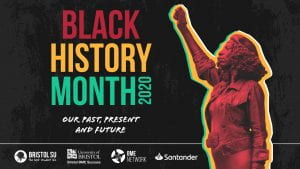 A special collaborative blog for Black History Month by the School of Education, University of Bristol
A special collaborative blog for Black History Month by the School of Education, University of Bristol
This year, many new students on undergraduate, master’s and doctoral programmes at the School of Education are beginning their studies at different locations around the world. While we are geographically dispersed, our School and University are very much rooted in the history of Bristol.
As we begin the academic year in Black History Month, an excellent way to become familiar with your new academic home is by taking some time to understand Bristol’s unique role in global Black histories, in terms of the historical injustices of slavery, but also its rich traditions of resistance and organising for racial justice and recognising the cultural heritage and the dynamic opportunities it offers.
We can see evidence of the transatlantic slave trade without leaving Berkeley Square, home to the School of Education as well as the University’s Law School. The Legacies of British Slavery Ownership Database at University College London records information on seven individuals residing at Berkeley Square, including one at 34 Berkeley Square (likely within the walls of the current School of Education), who enslaved people, mainly in British Colonies in the West Indies.
When slavery was abolished in 1833, the Parliament voted to “compensate” former slave owners for their “loss,” awarding over £152,000 to the residents of Berkeley Square, which is equivalent to over £17,000,000 today.
Much of Bristol’s recent Black history can be traced to the “Windrush Generation,” people of African descent from Caribbean colonies who migrated to Bristol in the decades following World War II. In addition, many people migrated to Bristol from Somalia and the horn of Africa, mainly in the 1990s, meaning that the city has a diverse Black community representing different religions, and linguistic heritage.
Bristol is home to a vibrant Somali community and a project carried out by the Black South West Network provided insights into their heritage. There are also several different organisations that students could participate in such as volunteering for the Somali Resource Centre.
However, Bristol has also been the site of significant struggles for racial justice in the UK. The 1963 Bristol Bus Boycott was a landmark in race relations in the UK. As the city bus company and its union refused to hire Black or Asian staff on the bus service, thousands of Black Bristolians and many White supporters refused to use the bus service, supported by a protest march of University of Bristol students.
On the same day that Martin Luther King gave his famous “I Have a Dream Speech,” the city bus company agreed to end its racist hiring practices. The boycott was widely cited as a turning point in racial justice in the UK, leading to the Race Relations Act in 1965.
A recent exhibition by Dr Lindsey Horner gives insights into history of the School of Education and its intersections to global Black History during this time. A series of archive entries highlight connections between the School and universities in Sub-Saharan Africa, including a programme to educate teachers at Uganda’s Makerere University and the first generation of Commonwealth scholars.
At the same time, photographs in the archive suggest that graduating teachers at the SoE were overwhelmingly White, pointing to the poignant historical irony that social circumstances were more favourable to educating Black teachers in Africa than in Bristol.
Even after the boycott, Bristol has remained highly segregated for decades to follow. In a 2019 interview with the Guardian, Bristol’s Mayor Marvin Rees, the first Black mayor elected in the UK, describes the racial discrimination he encountered in childhood, including being refused housing in many areas of the city.
Marvin also discusses how he witnessed riots that occurred in the St Paul’s area of the city, connected to police raids and underlying racial tensions. Today, St Paul’s is home to many iconic murals that celebrate the area’s central role in the city’s Black History, and the St Paul’s Carnival is a highlight of the city’s cultural life.
More recently, the 2017 Runnymede Report ‘Bristol: A city divided?’ exposed stark disparities in education and employment outcomes for Black people in the city. Rather than leading to hopelessness and resignation, this study served to galvanize Bristolians, leading to a series of city-wide ‘conversations’ culminating in the establishment of the One Bristol Curriculum (OBC). OBC is an initiative to redress historical biases in the curriculum by developing schemes of work and other resources for schools that properly recognise and value the contributions of Black people in the city.
The OBC website has student videos and regular updates about the project. The School of Education is working with OBC in several ways, and from 2020 undergraduate students will have the opportunity to support this initiative through the placement scheme.
In 2020, Bristol’s past and future intersected in the toppling of the statue of Edward Colston, a prominent slaveholder in seventeenth- and eighteenth-century Bristol. The symbolic victory against White Supremacy gained worldwide attention as part of global protests in support of the #BlackLivesMatter movement, highlighting Bristol’s position in championing racial justice globally.

Even amidst the pandemic, exciting initiatives are highlighting the significance and richness of Black history in Bristol. The CARGO Movement is a collective of artists, poets and musicians who create digital heritage resources focusing on the lived experiences of Black individuals in Britain. It has created an immersive exhibit installed in four steel shipping containers (creating symbolic links to the transatlantic slave trade), a short documentary on race riots in Bristol, a book, and history curriculum materials for secondary school students. Cargo will be presenting on this work at a Bristol Conversations in Education event on 11 November.
CARGO’s most recent project is Universal City, launched in partnership with the University of Bristol on 30 September. It features an interactive map of Black-owned businesses in Bristol, and is offering students entry into a prize draw for a selfie posted at three different locations, posted to the Instagram hashtag #BristolUniversityCity tagging @ucbristol. Selfies or not, visiting Bristol’s Black-owned businesses is a fun and exciting way to better understand how Black History enriches the lives of Bristolians today.
The University of Bristol Students’ Union has organised an excellent series of events to celebrate Black History Month, many of which pick up the history of our city as briefly highlighted here, and which explore opportunities for educators and students to challenge racial injustice. We hope you’ll be able to attend some of these events as well as having the opportunity to learn more about Bristol and to contribute to work towards racial justice in your studies here in the School of Education.
Special thanks
The School of Education wishes to thank Professor Arathi Sriprakash, Professor Leon Tikly, and Ugbaad Aidid for helpful feedback and edits on a draft of this blog.
